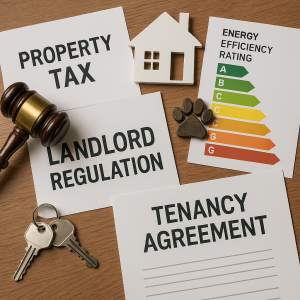If you’re a landlord in the UK, you’ll know it has been a tricky 2025. Not just in terms of property values, but the rollercoaster of property regulations associated with it. From tax tweaks to tenant rights, the landscape is changing fast, and staying ahead is no longer optional. Here are some reminders to consider, whether you’re a first-time or an experienced investor. Please note that some of the following do not have an official start date. Like with any government regulation, there are always delays and potential last-minute changes.
🏠 No More ‘No-Fault’ Evictions
The abolition of Section 21 means landlords can no longer evict tenants without a valid reason. Instead, you’ll need to rely on Section 8, citing specific grounds like rent arrears or selling the property. You’ll need to ensure that you are actually selling the property and not just re-renting it out to new tenants once the evicted ones have left, otherwise there are implications such as fines. This change aims to protect tenants but also demands tighter documentation and legal awareness from landlords.
📜 Fixed-Term Tenancies Are Out
Say goodbye to fixed-term contracts. All tenancies will now default to periodic agreements, giving tenants more flexibility to leave with two months’ notice. For landlords, this means less predictability and a need to rethink long-term planning.
💸 Tax Changes That Bite
Stamp Duty Land Tax (SDLT) and Capital Gains Tax (CGT) have both seen adjustments. SDLT thresholds have shifted, and CGT rates now vary more sharply depending on income brackets. These changes could impact profitability, especially for those with larger portfolios.
🐾 Pets, Please
Landlords can no longer blanket-ban pets. Unless there’s a valid reason, tenants have the right to keep furry companions. Time to revisit those tenancy agreements. It does make it difficult as tenant deposits are also capped so simply adding an extra amount to protect your home from pet damage is limited.
🌍 Energy Efficiency Gets Serious
Based on current plans, from 2030, all newly rented properties must meet a minimum EPC rating of C. Non-compliance could mean fines. Currently, the minimum is a rating of E, so there’ll be plenty of work to be needed to jump to a C, especially if it’s an older home. If your property is still lingering at an E, or you’re looking at purchasing one that’s below a C, you’ll need to think about how you’ll meet the new regulations or ensure you budget appropriately to reach it.
🔍 Digital Compliance Portal Incoming
A new property portal will require landlords to register and prove compliance with safety and legal standards. Think of it as your rental résumé—visible to tenants and local authorities alike. As with most new compliance like licences and registers, the good landlords will apply and register, while the “less good” ones will just ignore it so it will be interesting to see how that is implemented and policed.
Property Regulations
In short: adapt, upgrade, and stay informed. The rules are changing, but with the right prep, your investments can still thrive. And as always, you can track your searches and run your numbers through the deal analyser spreadsheet.
